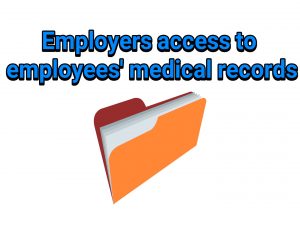As Long Island employment lawyers, one of the questions we encounter is whether an employer can ask an employee for medical records. A request of this nature can implicate issues relating to disability discrimination laws, such as the Americans with Disabilities Act (ADA), and the Family Medical Leave Act (FMLA). Today’s Long Island employment law blog tries to shed some light on the issue.
Requests for Medical Records Under Anti-Discrimination Laws
The EEOC has consistently noted that employers with legitimate concerns relating to an employee’s medical condition which may impact that employee’s ability to perform the essential functions of his job, may make any inquiry into that employee’s medical history. But, that inquiry must be limited and related to the medical condition at issue.
For example, in an October 4, 2004 discussion letter, the EEOC noted that an employer may make inquiry into an employee’s use of sick time, but may not ask for documentation unrelated to the employee’s use of sick time or “for more information than is necessary to justify the sick leave request.”
Similarly, in the discussion letter, the EEOC discussed a situation where an employee seeks to return from work from a medical leave. The EEOC stated the employer could permissibly inquire into whether the employee’s ability to perform the essential of his job would be compromised by the medical condition giving rise to the leave or whether he will present a direct threat, meaning that the employee may pose a significant harm to the health or safety of the employee or others. As for scope of the inquiry, in its opinion letter, the EEOC looked at a hypothetical involving a pilot’s return to work and stated that medical documentation relating to up to a year before the leave may be appropriate, but beyond that would be too “far ranging.”
The EEOC guidance further discusses a scenario where an employer is concerned about an employee’s performance. When the employee is confronted by the employer about the issues, the employee notes that she has been diagnosed with lupus and prescribed medication for that condition. The EEOC says a permissible inquiry would be limited to, “[] ask her whether she is taking a new medication and how long the medication’s side effects are expected to last[], or the supervisor may ask Sally to provide documentation from her health care provider explaining the effects of the medication on Sally’s ability to perform her job.”
In sum, employment discrimination laws do not completely foreclose employers from inquiring into an employee’s medical history nor do they absolutely prohibit employers from asking for medical records. Rather, the request must be limited in time and scope. The request must be limited to inquiry into conditions and/or treatments which may impact an employee’s ability to perform the essential of his or her job and it must be related to the medical condition which may be responsible for that impact. Far reaching, broad based, general inquiries, or “fishing expeditions,” are not permitted.
Requests for Medical Records Under the FMLA
The Family Medical Leave Act (FMLA) allows employees to take up to 12 weeks of leave from work because of a serious health condition. The FMLA allows employers to ask the employee for medical certification sufficient to show the employee’s entitlement under the law. In other words, the medical certification must establish facts sufficient to show the employee has a serious health condition, as defined by the law.
The employee is not required to produce supporting medical records nor must the employee sign a medical release, but a release may be required if the medical certification cannot sufficiently establish the existence of a serious medical condition. The certification is the only required documentation, but it must sufficiently show the condition. An employer can, however, contact the employee’s medical provider to seek clarification of information on the medical certification. Important caveats are that the contact must be made by HR personnel, a health care provider, or other administrative or management individuals. The employee’s direct supervisor may not contact the employee’s medical provider nor can anyone on the employer’s behalf seek information beyond the scope of the medical certification.
An employer can assert that the medical certification is not complete and ask that the employee provide further information. The request must specifically state in writing why the certification is deemed insufficient and the employer must provide a reasonable opportunity to fix the issues.
Help is Available for Employees with Medical Conditions
The laws concerning medical records and an employer’s right to access those records can be complicated. If you are concerned about your employer requesting medical records or if you are an employer who believes you need access to an employee’s medical records, contact a Long Island employment lawyer. More information is available on our website at http://linycemploymentlaw.com. Our lawyers are available by phone at 631-352-0050.

Employers access to employees’ medical records
 Long Island Employment Law Blog
Long Island Employment Law Blog

